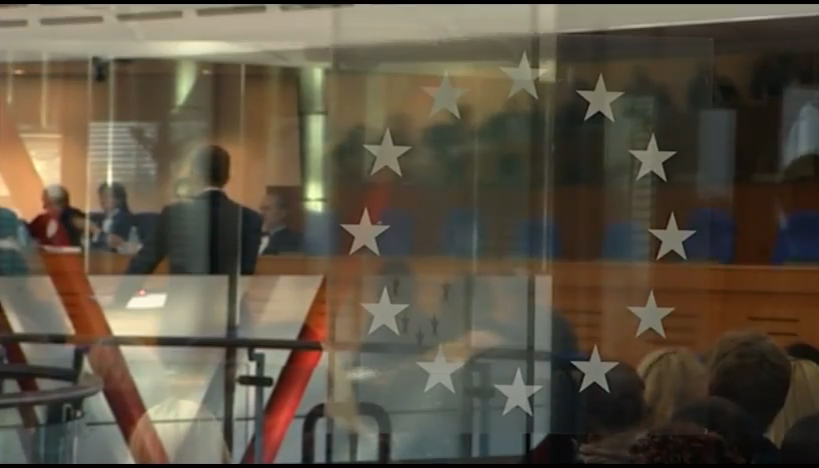

Asserting that the "right to manifest religion at work is protected but must be balanced against rights of others", the European Court of Human Rights announced its judgment in the consolidated cases Eweida and Others v. the United Kingdom (nos. 48420/10, 59842/10, 51671/10 and 36516/10). In its ruling of 15 January 2013, the Court held
- by five votes to two, that there had been a violation of Article 9 (freedom of religion) of the European Convention on Human Rights as concerned Ms Eweida;
- unanimously, that there had been no violation of Article 9 of the European Convention, taken alone or in conjunction with Article 14 (prohibition of discrimination), as concerned Ms Chaplin and Mr McFarlane; and
- by five votes to two, that there had been no violation of Article 14 taken in conjunction with Article 9 as concerned Ms Ladele.
Judges Bratza and Björgvinsson and De Gaetano and Vučinić expressed partly dissenting opinions which are annexed to the judgment.
From the Court's Press Releases: In making its judgment the Court emphasised the importance of freedom of religion, as an essential part of the identity of believers and one of the foundations of pluralistic, democratic societies. Freedom of religion under Article 9 of the Convention includes freedom to manifest one’s religious belief, including in the workplace. However, where an individual’s religious observance impinges on the rights of others, some restrictions can be made. It is up to the authorities of the Contracting States, in the first place, to decide what is necessary. The Court’s task is to review whether the measures taken at national level were justified in principle and struck a fair balance between the various competing rights and interests.
The applicants, Nadia Eweida, Shirley Chaplin, Lillian Ladele and Gary McFarlane, are British nationals who, relying on Article 9 (freedom of thought, conscience and religion) and Article 14 (prohibition of discrimination), complained that UK law did not sufficiently protect their rights to freedom of religion and freedom from discrimination at work. All four applicants are practising Christians. Ms Eweida, a British Airways employee, and Ms Chaplin, a geriatrics nurse, complained that their employers placed restrictions on their visibly wearing Christian crosses around their necks while at work. Ms Ladele, a Registrar of Births, deaths and Marriages, and Mr McFarlane, a counsellor for a national organisation which provides a confidential sex therapy and relationship counselling services, complained about their dismissal for refusing to carry out certain of their dutieswhich they considered would condone homosexuality. The Court held a hearing in this case on 4 September 2012.
In its judgment of 15 January the Court considred that in the cases of Ms Eweida and Ms Chaplin there had been an interference with both women’s right to manifest their religion in that they had been unable to wear their crosses visibly at work.
In Ms Eweida's case, the Court found that a fair balance had not been struck between, on the one side of the scales, her desire to manifest her religious belief and to be able to communicate that belief to others, and on the other side of the scales, her employer’s wish to project a certain corporate image (no matter how legitimate that aim might be). Indeed, other BA employees had previously been authorised to wear items of religious clothing such as turbans and hijabs without any negative impact on BA’s brand or image. Moreover, the fact that the company had amended the uniform code to allow for visible wearing of religious symbolic jewellery showed that the earlier prohibition had not been of crucial importance. The domestic authorities had therefore failed sufficiently to protect Ms Eweida’s right to manifest her religion, in breach of Article 9.
In the case of Ms Chaplin, on the other hand, the reason for asking Ms Chaplin to remove her cross, namely the protection of health and safety on a hospital ward, was inherently of much greater importance. Moreover, hospital managers were better placed to make decisions about clinical safety than a court, particularly an international court which had heard no direct evidence. The Court therefore concluded that requiring Ms Chaplin to remove her cross had not been disproportionate and that the interference with her freedom to manifest her religion had been necessary in a democratic society. Accordingly, there had been no violation of Article 9 as concerned Ms Chaplin.
As to Ms Ladele and Mr MacFarlane, the Court considered that the most important factor to be taken into account was that the policies of the applicants’ employers – to promote equal opportunities and to require employees to act in a way which did not discriminate against others – had the legitimate aim of securing the rights of others, such as same-sex couples, which were also protected under the Convention. In particular, in previous cases the Court had held that differences in treatment based on sexual orientation required particularly serious justification and that same-sex couples were in a relevantly similar situation to different-sex couples as regards their need for legal recognition and protection of their relationship.
The authorities therefore had wide discretion when it came to striking a balance between the employer’s right to secure the rights of others and the applicants’ right to manifest their religion. The Court decided that the right balance had been struck and therefore held that there had been no violation of Article 14 taken in conjunction with Article 9 as concerned Ms Ladele, and no violation of Article 9 – taken alone or in conjunction with Article 14 – as concerned Mr McFarlane.
The judgment was issued only in English and is not final.
